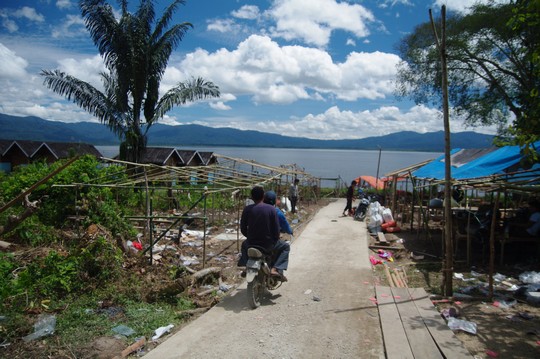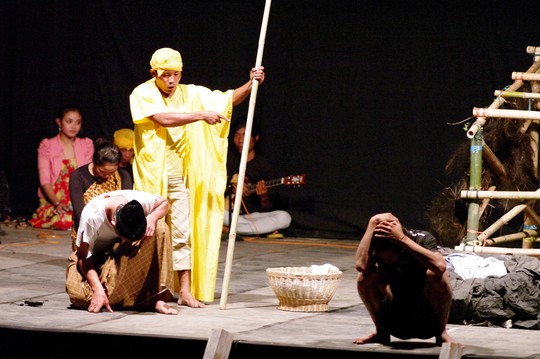Conservation has to adapt to the constraints imposed by local customs and traditions
Niniek Toley Acciaioli
Lindu, a highland plain surrounding a lake of the same name, lies in the mountains to the southeast of Palu, the provincial capital of Central Sulawesi. First colonised by the Dutch early in the twentieth century, it has remained relatively isolated. In the 1930s the Dutch first built a trail from Lindu to the main road to Palu. However, soon afterwards they discovered that schistosomiasis, a condition in which small parasites called schistosomes infest the liver and other internal organs, was present at Lindu. So the Dutch once again restricted traffic to and from the area. This was so that the snails that carry the schistosomes before they are released into standing water would not be carried down to the Palu Valley.
Into the new millennium, the unimproved trail to the main Palu road provided the primary access to and from Lindu. Horses were used to carry rice, coffee and other produce for four or more hours down to the road. Bugis migrants from South Sulawesi dominated this trade, as they were able to use their patron-client networks to organise a marketing system for fish from Lake Lindu and to care for the pack horses they organised to carry goods.
Motorcycles bring changes
However, in 2001, funds from the Central Sulawesi Integrated Development and Conservation Project were used to widen and improve the trail. Suddenly, motorcycle taxis could carry passengers and goods to and from Lindu. This changed the local economy. With cheap credit available from Chinese dealers, indigenous Lindu people could afford to buy motorcycles. Young Lindu men began transporting goods to and from Lindu on their own motorcycles. Families could bring their products to sell in Palu at higher prices, rather than depending on Bugis intermediaries.
This access improved the economy in general, but more specifically it improved the position of indigenous Lindu people, many of whom began to make more money from selling fish, rice, coffee and, increasingly, cocoa . Soon, many of them owned televisions and outboard motors for their dugout canoes, and many could afford to put cement floors in their houses.
However, motorcycle access has created other problems. In 1993, the area surrounding Lindu was gazetted as the Lore Lindu National Park, and Lindu was recognised as an enclave within it. To continue protecting the surrounding forests, the park management authority has worked to restrict access. Building a road to Lindu to allow cars and trucks would certainly have provided a route for illegal logging. As it is, the improved motorcycle trail has provided more opportunities for outsiders to enter the Lindu plain unnoticed. And it is precisely these newer unregistered migrants from places like Tana Toraja in South Sulawesi who have been opening up cash crop gardens in the national park beyond the Lindu enclave.
Other aspects of conservation in the national park have also been affected. Monkeys and birds, including the local species of the endangered hornbill, are no longer seen on the trail to Lindu, as they keep their distance from the roar of the motorcycles. The increased traffic has also led to increased waste. Bottles, plastic wrappings for the ice that preserves fish, and other plastic items now litter the trail.
Indonesia’s first conservation subdistrict
 |
|
Litter left by visitors to the Festival of Lake Lindu December, 2010 / Greg Acciaioli |
The problem of waste disposal has also been heightened by the changing political context. The government recognised Lindu as Indonesia’s first ‘conservation subdistrict’ at the end of 2007. The very next year it was included in the new district of Sigi. Eager to boost tourism revenue, successive Sigi district heads (bupati) have been transforming Lindu into a tourism centre for the district, as only Lindu has such an attractive landscape centred on a lake. Fifteen cottages – one for each subdistrict in Sigi – have been built on the lake’s shore, and there is talk of a resort and water skiing facilities.
As part of its tourism plans, the district also inaugurated an annual Festival of Lake Lindu in 2009. The government intended this festival to be a celebration of the diversity of local customs (adat) of Sigi’s communities, and a lure for domestic and international tourists. The first festival was initiated with a customary welcome ceremony and a procession of elders accompanying government officials to the newly constructed festival site by the lake. The bupati was even fined a water buffalo by the governor for standing up before the honoured guests, including the governor himself, had finished eating. This is a customary offence in Lindu.
The second Lake Lindu Festival, held at the end of 2010, carried a more explicitly conservationist theme: ‘Lindu: Where Custom Meets Conservation’. Opening with the customary greeting and procession, the first event of the festival was the payment of the water buffalo fine by the previous bupati. Many presentations highlighted environmental themes in the lyrics of songs and the settings of dances. One subdistrict presented a play about how a spirit guardian of a local spring punished a youth it caught spying on young girls bathing there. Traditional ceremonies were packaged for presentation as ways of conserving the environment.
A development dilemma
Some spectators were not happy with these presentations. Some devout Muslims voiced their disquiet over depictions of local guardian spirits. Many Lindu elders were incensed at the demands of the governor’s protocol officials that adat ceremonies be shortened to accommodate the governor’s busy schedule. Local managers of the event and numerous local inhabitants were dismayed by the huge amount of litter left at the lakeside and in the lake by all the spectators, souvenir and clothes sellers, and food stall operators who attended. ‘Where Custom meets Conservation’ threatened the integrity of local adat and produced a huge amount of pollution at Lake Lindu.
Lindu is caught in a dilemma. On the one hand, its people endeavour to establish themselves as custodians of conservation who should be allowed to manage their local environment on the basis of their adat. On the other hand, as a now quite accessible tourism site for Sigi district, the lake is subject to more offences against both adat and the environment than ever before. It is hard to know how this will all work out in the future, but if the Sigi district government and Lindu Adat Council can effectively work together, there is still hope that they will find a way to preserve the scenery and resources of Lindu.
Niniek Toley Acciaioli (tolley_ninik@yahoo.com) is the first indigenous Lindu woman with a bachelor degree. She has worked as a researcher for the Central Sulawesi Integrated Area Development and Conservation Project (CSIADCP), for The Nature Conservancy and in the World Bank’s Social Capital Initiative in Indonesia.












